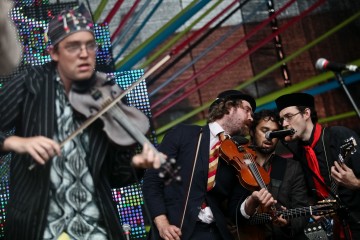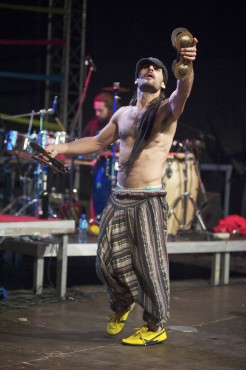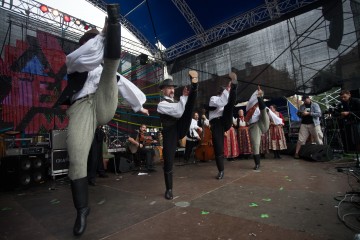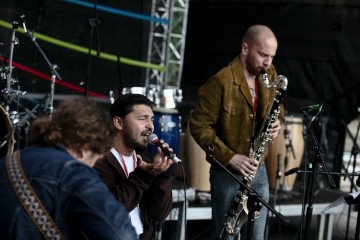Between 1 July and 31 December 2011, Poland will preside over the works of the Council of the EU. The Cultural Programme of the Inauguration of Presidency, an all‑day musical performance on 1 July, 2011, took place on four stages set up especially for this event, each dedicated to a different music genre. The programme of the Inauguration also comprised of a premiere performance of a 50‑minute piece by Paweł Mykietyn, Symphony No 3, specially composed for the Inauguration of the Polish Presidency of the EU Council.
EUharmony – world music stage, New Town Squere
We travelled a 10-hour musical journey through Europe and the cultural minorities of Poland, present and past.
 The Destroyers, photo Michał Lepecki
The Destroyers, photo Michał Lepecki
Over a hundred musicians from all over Europe performed at the New Town Square, demonstrating how different musical traditions can mix while maintaining their unique character and forming a new style. Cultures, styles, and modes of expression will intermingle, combining tradition and modernity. Guitars, trumpets, drums, violins, and upright basses were accompanied by unique instruments such as the hurdy-gurdy, the mandora, the Scandinavian Mora-harp, the karkabuz from Morocco, and the Biłgoraj suka along with the Płock fiddle – historic Polish instruments reconstructed from old illustrations and archaeological findings.
The folk song and dance group Teka performed traditional pieces from various Hungarian regions. DROM, a band inspired by Gypsy-swing roots, took the stage with the outstanding Gypsy singer Adam Kozłowski.
The Gypsies from the Bucharest-based ensemble Mahala Rai Banda were accompanied by Polish highlanders – Tomasz Jabko Łapka (violin), and Stanisław Karpiel Bułecka (vocals), while Gooral (Mateusz Górny) spiced up their traditional sound with an electronic twist. The Warsaw Village Band appeared alongside the legendary Swedes from Hedningarna, performing in Poland for the first time ever.
 elbicho, photo Miłosz PolochWestern Europe was represented by The Destroyers, a 15-member group from the United Kingdom offering a fusion of Balkan, Celtic, Greek, and Italian music in a punk-cabaret style. The energetic English lads were joined by Czessband, whose musical program is inspired by Warsaw’s folk tradition. An appearance by the band Nefesh, led by Raphael Rogiński, featured a joint performance by Greek and Turkish musicians, reconnecting two Mediterranean cultures that, up until recently, had lived in harmony. The group Cukunft, which employs modern means of expression to continue the tradition of Jewish music – mostly of the Eastern European Klezmer variety – performed alongside Israeli musicians whom audiences may recognise from Balkan Beat Box and Boom Pam. The evening ended with a concert by a Spanish underground legend elbicho, known for their brave fusion of flamenco and progressive rock with Afro-Latin rhythms, reggae, and ska.
elbicho, photo Miłosz PolochWestern Europe was represented by The Destroyers, a 15-member group from the United Kingdom offering a fusion of Balkan, Celtic, Greek, and Italian music in a punk-cabaret style. The energetic English lads were joined by Czessband, whose musical program is inspired by Warsaw’s folk tradition. An appearance by the band Nefesh, led by Raphael Rogiński, featured a joint performance by Greek and Turkish musicians, reconnecting two Mediterranean cultures that, up until recently, had lived in harmony. The group Cukunft, which employs modern means of expression to continue the tradition of Jewish music – mostly of the Eastern European Klezmer variety – performed alongside Israeli musicians whom audiences may recognise from Balkan Beat Box and Boom Pam. The evening ended with a concert by a Spanish underground legend elbicho, known for their brave fusion of flamenco and progressive rock with Afro-Latin rhythms, reggae, and ska.
The cultural mix didn’t end there. During concerts, audiences had a chance to try the delicacies of the world’s cultures: apart from traditional Polish pierogi, cheese from the Korycin region, and the oscypek (a sheep’s cheese made by Polish highlanders), there were traditional dishes from Vietnam, Senegal, Chechnya, Armenia, Russia, and Hungary, and have an opportunity to sample Tatar and Jewish culinary culture.
Curator: Anna Mamińska












































